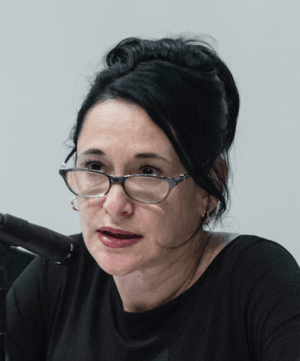Nadia Abu El Haj facts for kids
Quick facts for kids
Nadia Abu El-Haj
|
|
|---|---|
 |
|
| Born | 1966 (age 59–60) |
| Education | Bryn Mawr College (AB) Duke University (PhD) |
| Occupation | Anthropologist, academic |
| Scientific career | |
| Institutions | Barnard College, Columbia University |
Nadia Abu El-Haj (Arabic: نادية أبو الحاج) was born in 1966 in the United States. She is a well-known anthropologist who teaches at Barnard College and Columbia University. An anthropologist studies human societies, cultures, and their development.
Nadia Abu El-Haj has written important books, including Facts on the Ground: Archaeological Practice and Territorial Self-Fashioning in Israeli Society (2001) and The Genealogical Science: The Search for Jewish Origins and the Politics of Epistemology (2012). In 2007, she was granted tenure, which means she received a permanent teaching position at her university.
Contents
About Nadia Abu El-Haj
Her Early Life and Schooling
Nadia Abu El-Haj grew up in the United States. Her mother was American, and her father was Palestinian. This gave her a diverse family background.
When she was younger, she lived in Tehran, Iran, and Beirut, Lebanon, for a few years. This was because her father worked for the United Nations and was stationed there. She attended private schools in these countries.
Her College and Advanced Studies
After returning to the United States, Nadia Abu El-Haj went to Bryn Mawr College. There, she earned her Bachelor of Arts degree in Political Science. She then continued her studies at Duke University, where she received her doctoral degree.
She also completed special research programs at other famous universities. These included Harvard University, the University of Pennsylvania, and the Institute for Advanced Study in Princeton, New Jersey. She is fluent in several languages, including English, Arabic, French, Persian, and Hebrew.
Her Career in Academia
Nadia Abu El-Haj began her teaching career at the University of Chicago in 1997. In 2002, she joined the faculty at Barnard College. She has also given lectures at many other respected institutions around the world. These include New York University, the University of Cambridge, and the London School of Economics.
She has received several important grants and fellowships for her research. These include awards from the Fulbright Program and the National Endowment for the Humanities. She also helps edit academic journals like American Ethnologist.
Her Research Work
Exploring Facts on the Ground
In 2001, Nadia Abu El-Haj published her book Facts on the Ground: Archaeological Practice and Territorial Self-Fashioning in Israeli Society. In this book, she looked at how archaeology is used in Israel. She explored how archaeological discoveries can shape how people understand history and their connection to the land.
She suggested that the way archaeological facts are presented can influence cultural beliefs and political ideas. This book received the Middle East Studies Association of North America's 2002 Albert Hourani Book Award.
Other Important Studies
Nadia Abu El-Haj's later research focuses on genetic anthropology. This field studies human origins and how different groups of people have moved around the world. She examines how companies offer genetic ancestry tests.
Her work also explores how ideas like race, diaspora (groups of people living away from their homeland), and kinship (family connections) are linked. She looks at how genetic information can help people understand their past.
Her Published Books
- Facts on the Ground: Archaeological Practice and Territorial Self-Fashioning in Israeli Society (2001)
- The Genealogical Science: The Search for Jewish Origins and the Politics of Epistemology (2012)
See also
 In Spanish: Nadia Abu El Haj para niños
In Spanish: Nadia Abu El Haj para niños
 | Dorothy Vaughan |
 | Charles Henry Turner |
 | Hildrus Poindexter |
 | Henry Cecil McBay |

